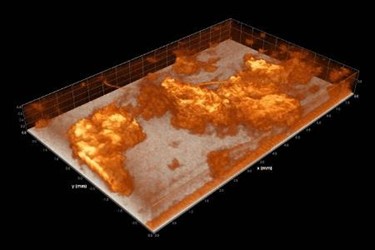German Sustainability Award For Bio-Electrochemical Fuel Cell

Monika Landgraf Strategic Development and Communication - Overall Communication
So far, sewage treatment plants are among the largest municipal energy consumers. With a new technology that turns the power-consuming wastewater treatment plant into a small power plant, a German research team now wants to initiate a turnaround. At the heart of the plant is a bio-electrochemical fuel cell that can generate electricity and hydrogen directly without the usual detour via the digestion process. The group has now been awarded the German Sustainability Award in the research category for the innovative concept, which involves researchers from the Karlsruhe Institute of Technology (KIT) and which is coordinated by the TU Clausthal.
The technology relies on fuel cells made from microorganisms that directly generate electric power and hydrogen when purifying wastewater: the bio-electrochemical fuel cell (BioBZ) can generate electrical energy without the usual detour via the digester process. Instead of laboriously working on the digestion of the wastewater and the subsequent use of the resulting digester gas, the BioBZ needs only one step and integrates the power generation directly into the microbial decomposition process of the ingredients contained in the water. Anaerobic bacteria grow on the electrodes of the BioBZ and can transfer electrons directly to the electrodes when reacting organic components from the municipal wastewater. The electrical current generated can then be used. This not only reduces the energy consumption, but it also increases the efficiency of power generation and cleaning significantly. At the same time, the process makes a contribution to improved wastewater treatment.
Co-ordinator is the CUTEC Environmental Technology Research Center of the TU Clausthal. Scientists from the Engler Bunte Institute at KIT, headed by Professor Harald Horn, have also contributed decisively to the successful joint project. In particular, they examined the process on the surface of the electrodes of the BioBZ. The bacteria growing on the electrodes can be visualized using an innovative imaging technique called optical coherence tomography (OCT). Over the last three years, the OCT has been developed so far at the EBI that it is now possible to use the image data directly for process control. KIT is one of the world's leading research institutions in this field.
Further project partners are TU Clausthal, TU Braunschweig, Eisenhuth GmbH & Co. KG and EURAWASSER Betriebsführungsgesellschaft mbH. The BMBF is funding the research project with its six subprojects in the funding measure "Sustainable Technologies and Concepts for Energy-Efficient and Resource-Efficient Water Management" (ERWAS) with a total of around three million euros.
More information about BioBZ: http://www.bio-bz.de/
Since 2008, the German Sustainability Award once a year recognizes top achievements in sustainability in business, municipalities and research. The German Sustainability Award for Research is donated by the Federal Ministry of Education and Research (BMBF). The award was presented by State Secretary Dr. Georg Schütte on Friday, December 8, 2018, at the German Sustainability Day in Düsseldorf. The award winner was determined in cooperation with the TV station ZDF / 3sat in the science magazine nano in a public voting.
Further information on the German Sustainability Award : https://www.nachhaltigkeitspreis.de/
As "The Research University in the Helmholtz Association", KIT creates and communicates knowledge for society and the environment. The goal is to make significant contributions to the global challenges in the fields of energy, mobility and information. Around 9,300 employees work together on a broad, disciplinary basis in natural sciences, engineering, business, humanities and social sciences. Its 26,000 students prepare the KIT for responsible tasks in society, economy and science through a research-oriented university degree. The innovation activity at KIT bridges the gap between knowledge and application for social benefit, economic prosperity and the preservation of our natural livelihoods.
KIT has been certified as a family-friendly university since 2010.
Source: Karlsruhe Institute Of Technology (KIT)
